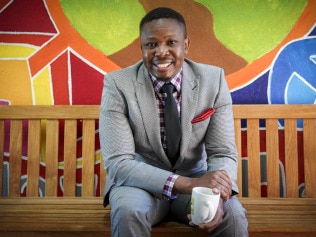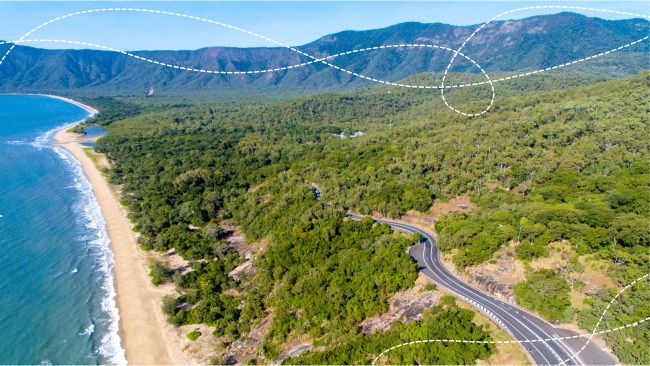Bring homelessness out of the shadows
Many South Australians are living week-to-week, or, facing difficult circumstances that can take a turn for the worse at any moment leaving them without a place to call home - it can happen to anyone.

Many South Australians are living week-to-week, or, facing difficult circumstances that can take a turn for the worse at any moment leaving them without a place to call home - it can happen to anyone.
The weather is extreme and feels like torture. The rush of the 5pm crowd is unified in its objective to get home. Hardly anybody notices the faces that don't go anywhere.
Experiencing homelessness defines itself. Walking past people sleeping rough gives you no insight -you see just cardboard, cups, blankets, cigarettes, dogs and occasionally donated food. Community often files hardship at the back of the mind “for later”. But that’s not community … not in its definition of collective social values and responsibilities. Nobody wants this. Nobody deserves this.
After all, we're all vulnerable - many of us potentially just a few pay packets away from being without a home. It can happen fast, with little time to prepare. What would you take with you? How much can you carry?
If each of us stopped to ask and listen, and handed somebody living on the street a coin, that person could, for example, feed their dog and get some protected sleep. It’s a valid priority because, despite popular perception, that person is most likely not thinking about booze, drugs, bludging and brawling. She or he is thinking about friendships, family, transport, the cost of living, shelter and ways to relax.
The Australian Bureau of Statistics (ABS) defines a person experiencing homelessness as not having suitable accommodation alternatives and their current living arrangement is: in a dwelling that is inadequate; has no tenure, or if their initial tenure is short and not extendable; or does not allow them to have control of, and access to space for social relations. In Australia, the five-yearly ABS Census put those experiencing homelessness in 2016 at more than 164,000 people - a 13.7 per cent increase on the previous five years. That amounts to 50 of every 10,000 people: 58 per cent male and 42 per cent female.
As Vinnies SA CEO David Wark points out, experiencing homelessness is very personal. "We hear a lot about the statistics around homelessness – in SA there are more than 6000 people experiencing homelessness every night," he says. "But these aren’t just numbers, they’re people. And what has led them to homelessness might surprise you – for many it’s illness, a redundancy, a relationship breakdown. No one’s immune.”
Even for those who have accessed and managed income support payments under Newstart, its daily allowance is a paucity when it comes to striving to realise your potential under the costs of living. “The Newstart allowance of $40 is totally inadequate," says Mr Wark. "It is one of the main causes for people entering homelessness, along with a lack of affordable housing.
And while some are not living on the street, instead seeking refuge in cars, in the bush or in overworked shelters, they all hold hope for life out of the shadows - and to be regarded for their personalities rather than their predicaments. What if it was you or somebody you loved?
Kenneth is 41 years old, and explains his story: Formerly a teacher in Kenya, and formerly in long-term employment in his eight years as an asylum-seeking Australian resident, he is writing a book - "My Joblessness, My Headlessness”. His dream is to start a foundation for youth in Australia and in Kenya – possibly even worldwide. Sitting on his bed at the Vinnies Men’s Crisis Centre, he personifies the incongruence of public perceptions of those experiencing homelessness.
Immaculate in his suit, tie and pocket handkerchief, he opens a travel case and takes out real estate brochures for homes over a million dollars. He’s been to see some of them. It’s a coping mechanism after a mental collapse compounded by two broken partnerships, the premature birth of his third child seven months ago which, he says, saw him living in Flinders Hospital’s ICU with his ex-partner for two months – a reprieve from living in his car for four months, including in Melbourne on a job search.
He found work at an Adelaide outlet of a hardware chain he’d been at for two years in Alice Springs but could no longer endure the job amid the breakdown and living at various backpacker hostels.
He has a big smile that belies his stories well-versed in the depths of the human condition.
In his third week at the centre, he thanks his Vinnies support worker for putting him on track with things most take for granted, such as renewing his driver’s licence, and updating his clearance checks for working with children. He warns anybody in his predicament not to tough it out. Seek help.
“Thanks to Vinnies, I’ve had trauma counselling and I’m happy to talk about it,” he says. “And I’m job-ready – which is very important!” Kenneth details the various positions he’s held since living in Kenya, where he says his father is preparing his own land for what he hopes will be their foundation headquarters. Meanwhile he waits to hear if his most recent interview in “about 100 job applications” comes off, for a position working as an assessment and welfare officer at a youth centre in Alice Springs, where his daughter lives with her mum.
“It’s been five years since I’ve seen my children in Africa and seven months since I’ve seen my ‘little neonate’ (in Alice Springs),” he says. “I have more than $22,000 in my super in Australia that I cannot access. I feel like I’ve watched my older children grow up on face-time on a computer – and because of my Visa, I cannot travel back to Africa, even if I had the money.”
In SA, 33 per cent of homelessness stems from domestic violence. Mr Wark says one woman per week is killed as a result of domestic violence.
Mary is an organised, compassionate single mum. With her two young children and just their backpacks, she left a violent marriage and sought refuge interstate while police investigated allegations of sexual abuse of her daughter.
For the first time since moving to Australia from Scotland in 2002, aged 21, she found herself experiencing homelessness – and helplessness.
A career hairdresser since she was 15, she speaks with alternating reticence, optimism and frailty but her voice lifts as she thanks Vinnies for turning her life around. She is still overwhelmed by the Vinnies Women’s Crisis Centre’s determination for normalcy in their lives.
“We left with virtually nothing,” she says before faltering. “… Six weeks after arriving at a Vinnies women’s and children’s shelter, we had somewhere to stay, the use of a car and even lessons for the children in football and dancing. They gave us clothes, financial counselling, new phones so we’d be safe - and showers. Vinnies staff bend over backwards for you.”
Struggling to support her daughter, 7, and son, 3, on Centrelink, Mary has become all too accustomed to suffering and loss. Her mum died when she was aged just nine. She lost her father, an uncle and friends on a spiral of addiction to heroin and/or crack cocaine – her father died when she was 21. Her sister is a heroin addict. And the cloud of anxiety has quashed her desire to return to her small home town in native Scotland.
But her most shattering fear was the thought of perhaps losing her children after her family breakdown. “When I was going through the Family Court, I was running on adrenaline – the thought you could lose your children is the hardest thing for a mum," she says.
“It’s taken me a very long time to come out of my shell. I just kept to myself. Now, for the first time in eight years, I’m doing work at the Women’s Crisis Centre: these are my first few days!
“I wanted to give back for all the help my children and I have been given – I’m doing volunteer hairdressing for the ladies there and I feel like it’s making a difference. I see them dressing up a bit more and putting on some make-up to come and get their hair done. It’s lovely.”
Mary says when the stress is bad, she goes to the gym to hit the treadmill – and she thinks about her plan. Next year, when her son starts kindy, she'll undertake business studies so she can know all aspects of running her own salon.
Meanwhile she urges women and their daughters at risk not to hesitate - ask for help. “Don’t ever be afraid to ask,” she says. ‘It doesn’t mean you’re weak. And there is help out there.”
Vinnies reports more than 280,000 people seek help from homelessness services every year and Mr Wark is determined all people in need will be backed. “People I speak to who have accessed Vinnies services tell me that the greatest gift they received was that they felt no judgment," he says. "We listen and act without prejudice, we are in no way bureaucratic, and our guiding light is compassion.”
Vinnies Ph 8112 8700 - Assistance 1300 729 202 - Donations 13 18 12 - donate.vinnies.org.au - Email svdp@svdpsa.org.au
Originally published as Bring homelessness out of the shadows



